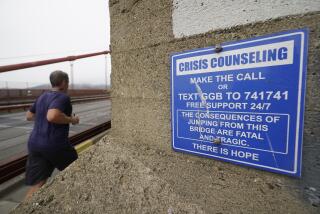24-Hour Medical Hotlines Growing, Thriving
- Share via
TRENTON, N.J. — For the frantic parent with a child sick at 2 a.m., the weekend athlete with a painful injury and the worker just diagnosed with diabetes, medical hotlines are becoming the equivalent of “Dr. Mom.”
They’re also a booming business for insurers, employers, physician practices and a growing, relatively new industry: telephone triage companies, where nurses operate 24-hour hotlines offering basic information on various illnesses and advice on whether a problem warrants an immediate trip to the emergency room, a call to the doctor the next day or just a couple aspirin.
The biggest, Access Health of Sacramento, has mushroomed from 500,000 members to more than 16 million in the last two years, and No. 2, Employee Managed Care Corp. of Seattle, expects to triple its 1.5-million-customer base this year.
Dozens of the nation’s Blue Cross-Blue Shield organizations have signed on with those companies or one of several competitors, and several major health maintenance organizations offer such hotlines, some staffed with their own nurses.
“While it is not intended to replace the physician, the service gives our members an additional partner in their health and medical decision-making 24 hours a day,” said William J. Marino, president of Blue Cross and Blue Shield of New Jersey, which last month began offering 170,000 members of its HMO Blue plan a hotline.
What’s feeding this growth?
Employers’ efforts to cut health care costs while keeping workers happy, managed care companies and doctors trying to lure more business, and the shift toward giving people more say in their health care, among other factors.
Most services use computer databases of information that help the nurses--generally RNs with at least five years’ experience in patient care--pinpoint the problem and the best advice. Many also offer telephone access to information tapes on hundreds of conditions or have interactive Web sites.
Services offered by employers, directly or through their insurance carrier, generally are free to the patient.
“They’re terrific!” said Jennifer Klein, a mother of two children who has used the service “easily more than a dozen times.” Her 6-year-old son last year developed a type of asthma triggered by viruses. When he began having attacks, a hotline nurse coached Klein through administering his new inhaler to dilate his bronchial tubes.
’ Physician and nurse associations have been debating the issue, questioning whether the hotlines are merely providing information or practicing medicine.
“They can prevent unnecessary visits to the emergency room, but they should never substitute for consultation with a physician,” said Dr. Thomas Reardon, vice chairman of the American Medical Assn.’s board of trustees.
More to Read
Inside the business of entertainment
The Wide Shot brings you news, analysis and insights on everything from streaming wars to production — and what it all means for the future.
You may occasionally receive promotional content from the Los Angeles Times.










